.45-70 Cartridge Overview: The Immortal Big Game Round
It’s hard to imagine the .45-70 Government as a brand-new round, untested and unproven either on big game or in battle. But that was the situation back in 1873, when it was introduced. That was a long time ago. Our country wasn’t even a hundred years old, and the Civil War was fresher to Americans back then than 9/11 is to us now. Giant herds of bison still darkened the Plains, but the great slaughter of these beasts was in full swing, and before long, fewer than 100 would remain in the wild.
This was the era of the Old West, which, to this day, remains securely fixed in our collective psyche. Our nostalgia for this time seems boundless. We still yearn for the simplicity, romance, and sheer possibility that the latter part of the 1800s represented to our young nation—even though the lens through which we view this period is wildly distorted in so many ways.
But one true thing that remains from that time is the .45-70 Gov’t. Benefiting from advances in powder and bullet technology, the .45-70 won’t quit. This round has endured decade after decade, winning over new generations of sportsmen who might initially be attracted to it as a historical curiosity, only to discover how versatile, and relevant, it remains for hunting big game and dangerous game today.
.45-70’s Mild Beginnings
The .45-70 started life as a black powder round, the .45 referring to the bullet caliber and the 70 to the weight in grains of the powder charge. The original projectile was a 405-grain lead bullet that exited the muzzle at 1,350 fps, give or take. Black Hills Ammunition and other ammo companies make loads today that basically mimic this performance but with smokeless powder. By today’s standards, this is a mild load, but it was all the original Springfield 1873 Trapdoor rifles could handle. It remains a great plinking round for the .45-70 and is fine on big game, provided the shots aren’t very far, since it has a trajectory like a brick being tossed off a cliff.
In strong modern rifle actions — “modern” being a rather subjective term, given the age of some of the designs that are characterized as such — the .45-70 transforms into a true thumper, capable of tipping over even the largest game. Handloaders have known this for years and have eagerly refilled their .45-70 empties to capacity with one powder or another — sometimes at the cost of common sense, lost digits, and whiplash — to achieve better velocities.
John B. Snow
Knockout Power and Improved Ballistics
Commercial companies followed suit. For dangerous game and other large critters, there are many high-power +P .45-70 loads on the market that push heavy bullets much faster than the original specs. Grizzly Cartridge, for example, has a great 420-grain flat-nose lead-cast bullet at 1,950 fps that will drill deep through tough hide and heavy bones. By way of comparison, this load generates 3,547 foot-pounds of muzzle energy, versus the original 405-grain load’s 1,639 foot-pounds.
The most significant recent development for the .45-70, however, was the advent of Hornady’s flex-tip (FTX) bullets in their Leverevolution line. These pointy bullets are safe to use in rifles with tubular magazines and shoot much flatter than traditional round- or flat-nose bullets.
Sighted in 3 inches high at 100 yards, a 325-grain FTX bullet at 2,050 fps hits dead-on at 200 yards and drops 27.8 inches at 300. Compare that to a 300-grain TSX bullet at 1,925 fps. Sighted in 3 inches high at 100, it hits dead-on at 150 yards, and has dropped 50 inches at 300 yards.
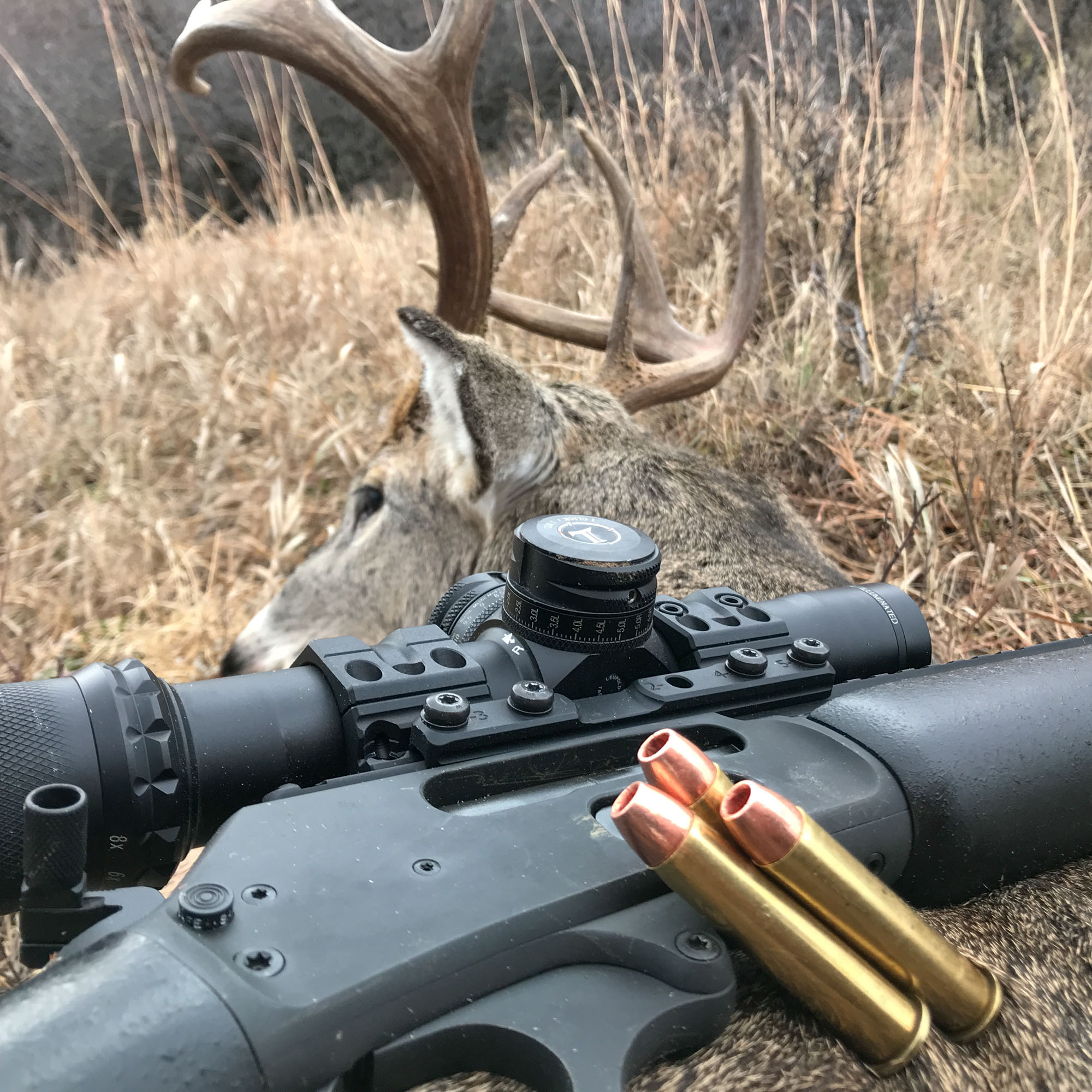
John B. Snow
All-Around Hunter
Chambered in a good lever gun, the .45-70 Gov’t is a consummate hunting rig for thick brush or timber. The rifles are short and handy, can be run very fast, and pack a wallop. Lever actions, being scabbard-friendly, are great for horseback hunts, but they are also ideal for hunting from a blind. For everything from elk to grizzlies to hogs, pairing a lever gun with the .45-70 is an excellent choice.
.45-70 Lever Actions and Single Shots

Right now you can pick up a new .45-70 lever-action from Marlin, in a few different trims including the 1895 SBL, and the newly released Dark Series 1895.
Henry Repeating Arms also makes some very good lever-action rifles chambered in .45-70. The Steel Lever-Action is a solid, basic rifle and if you want something more weather-resistant and rugged consider the All-Weather Picatinny Rail .45-70.
Henry also makes some single-shot .45-70s, for those that prefer the simplicity (and affordability) of that platform. The Traditions Outfitter G3 is another budget-minded single-shot, as is the CVA Scout V2 — both can be had for less than $500.
Best .45-70 Ammo
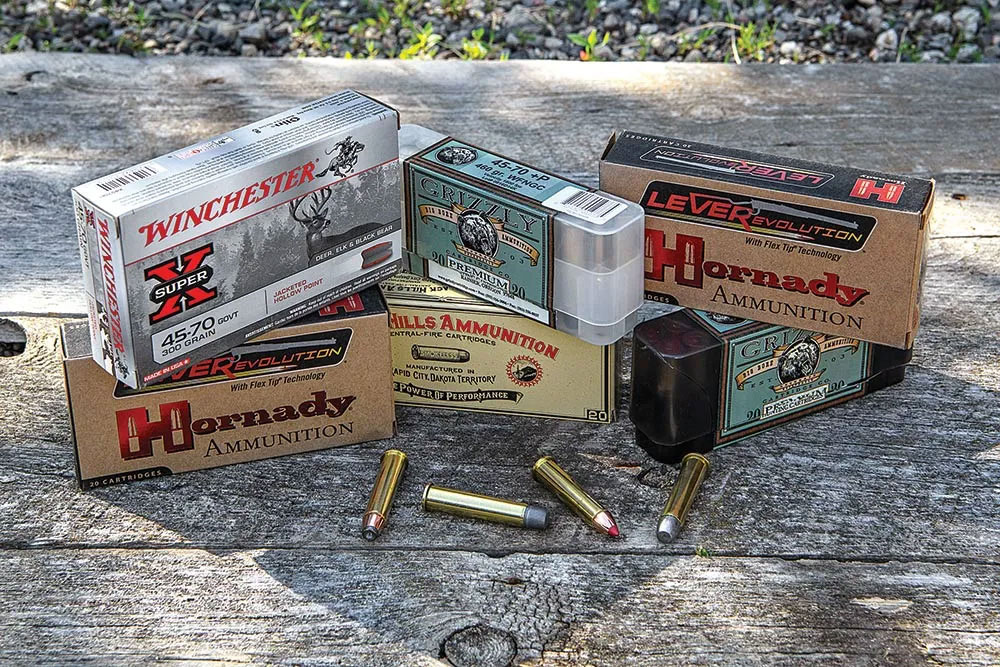
Bill Buckley
There are a lot of options when it comes to .45-70 ammo, but what’s offered typically falls into these general categories: plinking, medium game, large and/or dangerous game. Some plinking loads also double as rounds for cowboy action shooting. Medium game includes deer, hogs, and black bear. Large and dangerous game covers grizzly and brown bears, as well as large African game including Cape Buffalo.
Barnes Vor-TX 300-gr. TSX FN
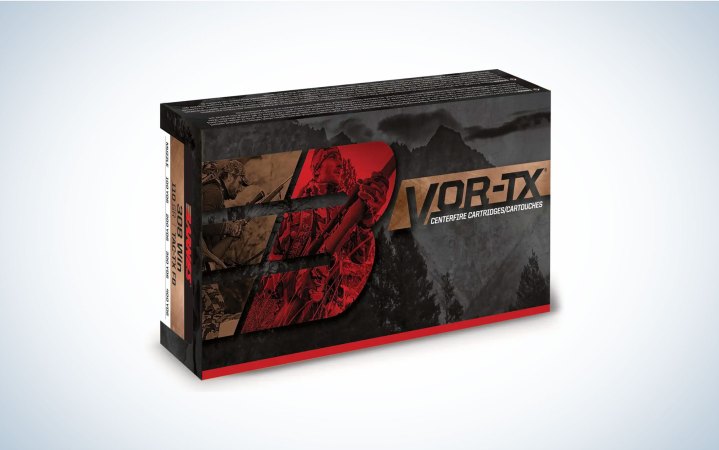
See It
- MV: 1,925 fps
- ME: 2,469 ft.-lb.
- Purpose: Medium Game
I’ve hunted with this load on a few occasions and can attest to its effectiveness on game. The hollowpoint on this all-copper bullet could double as a coffee cup and when it connects it quickly expands to create a significant wound channel. The fast-expanding design prevents it from over-penetrating. Interestingly, if you do shoot through an animal you can often find the spent bullet on the ground not far from the exit wound.
Hornady LeverEvolution 325-gr. FTX
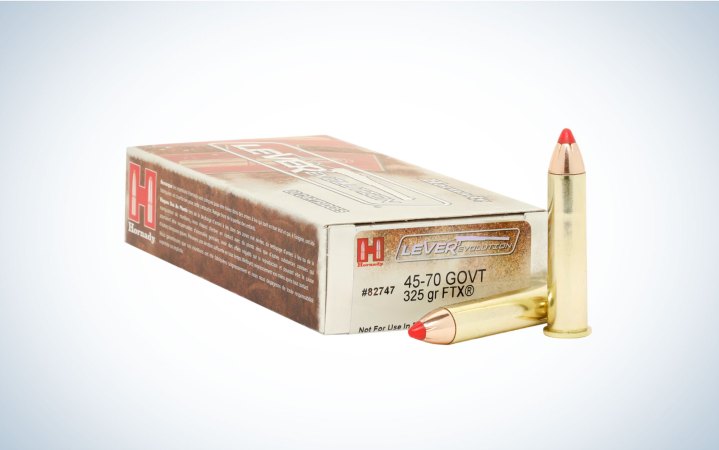
See It
- MV: 2,000 fps
- ME: 2,886 ft.-lb.
- Purpose: Medium Game
This was a game-changer for lever-action hunters. The flex-tip design allows for a sleeker and flatter-shooting bullet that can reach out on longer shots, yet can be run safely in a tubular magazine without fear of the bullet point touching off the primer of the round in front of it.
This bullet rapidly expands on game, mushrooming to an impressive diameter quickly after entering the animal.
Federal HammerDown 300-gr. BSP
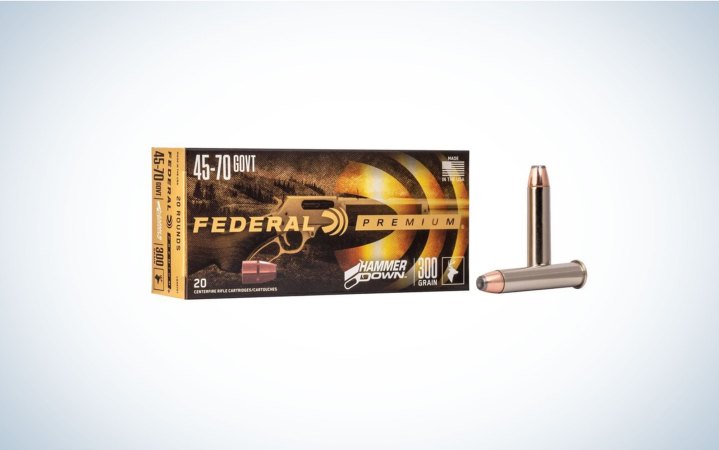
See It
- MV: 1,850 fps
- ME: 2,280 ft.-lb.
- Purpose: Medium game
This is a solid middle-of-the-road hunting load for the .45-70. The bonded softpoint has a substantial meplat to initiate expansion and the bonded construction helps the bullet hang together as it plows through tissue and bone. The recoil is quite manageable while delivering good terminal ballistics.
Black Hills 325-gr. HoneyBadger
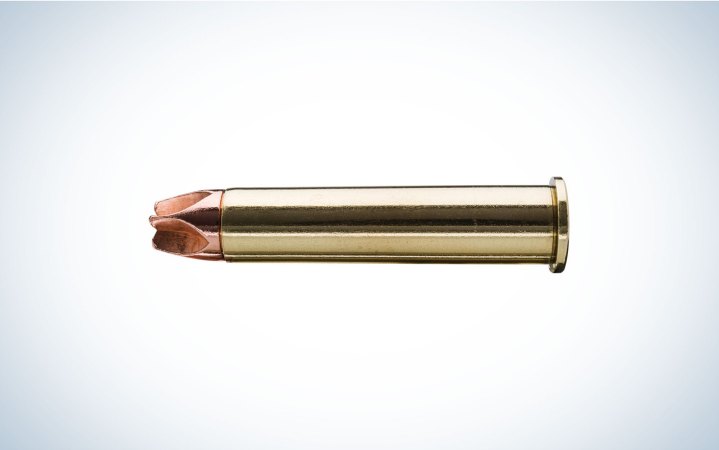
See It
- MV: 1,775 fps
- ME: 2,274 ft.-lb.
- Purpose: Medium Game, Large and Dangerous Game
Most hunting bullets rely on expansion to deliver their terminal effects. Not so with the HoneyBadger. The deep channels machined into the tip of this mono-metal bullet redirect the material they contact to the side, using the fluid-like dynamics of the tissue to create a deadly wound channel. The non-expanding design gives the HoneyBadger an advantage over many traditional bullets with its ability to plow straight, deep, and true through whatever it hits. That’s why it can pull double-duty as a bear stopper.
Black Hills 405-gr. Lead
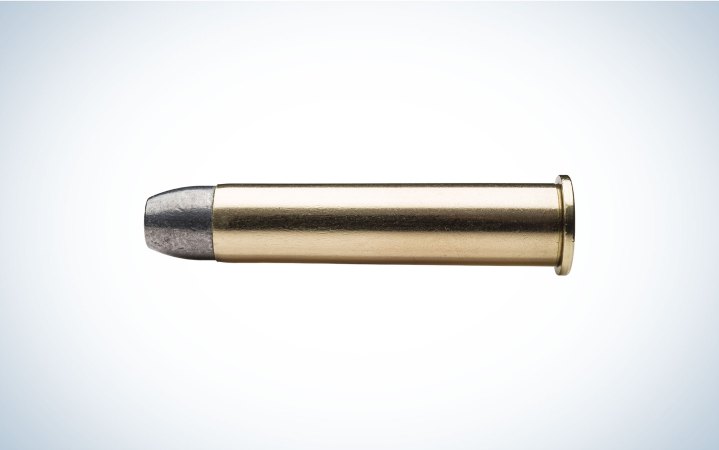
See It
- MV: 1,250 fps
- ME: 1,405 ft.-lb.
- Purpose: Plinking and Cowboy Action shooting
This easy-shooting round was developed expressly for cowboy action shooting and duplicates the ballistics of the original .45-70 Gov’t. The lead bullet is as basic as it gets and is perfect for plinking but isn’t designed for hunting beyond controlling small pests.
Underwood +P Extreme Hunter 325-gr. Solid Monolithic
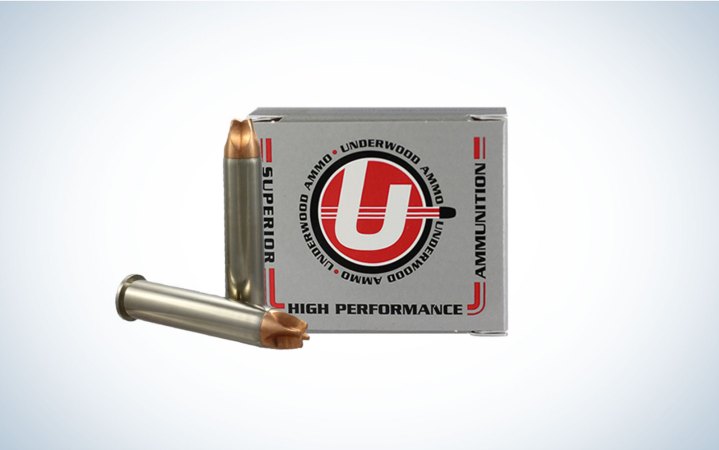
See It
- MV: 2,275 fps
- ME: 3,736 ft.-lb.
- Purpose: Medium Game, Large and Dangerous Game
This Lehigh Defense bullet is similar in design to the HoneyBadger, operating on the same principle of using deep channels in the tip to redirect tissue to create the wound cavity. The +P rating indicates this round has a bit more pep in its step, which is reflected in the published MV of 2,275 fps. That jacks the ME about 1,500 foot-pounds beyond the BlackHills load, making this a good option for bear protection as well as general hunting.
Buffalo Bore 350-gr. JFN Penetrator .45-70 Magnum
- MV: 2,145 fps
- ME: 3,575 ft.-lb.
- Purpose: Large and Dangerous Game
Buffalo Bore makes many high-powered .45-70 loads, covering the gamut from standard hunting loads for medium sized game (300-grain JHP) to niche rounds for dangerous African game (430-grain Hardcast Penetrator, 500-grain Barnes Buster).
The 350-grain JFN Penetrator is an all-around dangerous game load that expands only a little and is designed to penetrate four feet through muscle and bone. Because it expands a bit, it is suitable for non-dangerous game too. As with any deeply penetrating bullet you need to be aware of animals on the off side of your target as the bullet can zip through and keep going.
Note that Buffalo Bore designates the cartridge on these rounds as the .45-70 Magnum, and includes a list of rifles (such as the Marlin 1895) that they deem strong enough to handle it.
Remington Core-Lokt 405-gr. JSP

See It
- MV: 1,600 fps
- ME: 2,302 ft.-lb.
- Purpose: Medium Game and Plinking
This is one of the softer shooting .45-70 hunting rounds, but don’t let the leisurely 1,600 fps muzzle velocity fool you. The Core-Lokt 405-grain soft point is more than capable of handling whitetails and hogs, while producing a mild recoil.
Winchester Super X 300-gr. JHP
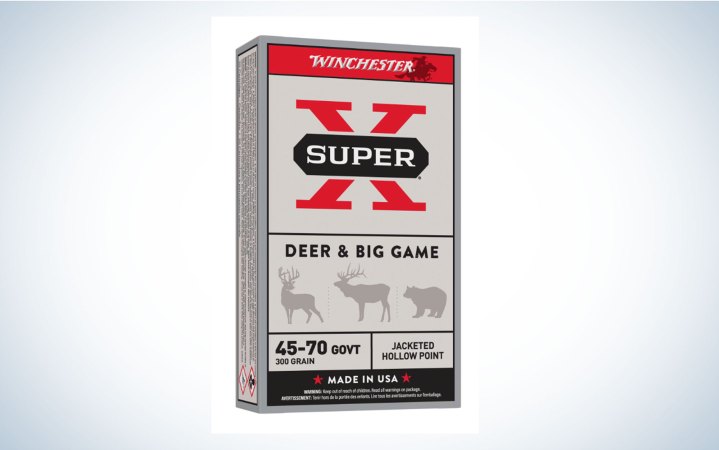
See It
- MV: 1,880 fps
- ME: 2,355 ft.-lb.
- Purpose: Medium Game/Deer
The Super-X line of ammunition has been a Winchester mainstay for more than 100 years. The 300-grain JHP in .45-70 will handle any medium sized game like deer, hogs, and bear, and wouldn’t be out of place to use on an elk in timber, provided you can stalk close enough (200 yards or in) to take the animal within the round’s effective range.
Garrett Cartridge Inc. of Texas, 420-grain SuperHardCast
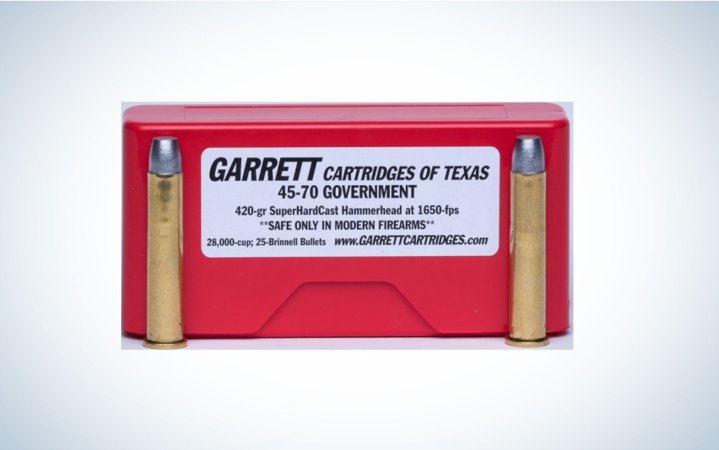
See It
- MV: 1,650 fps
- ME: 2,540 ft.-lbs.
- Purpose: Medium to Large/Dangerous Game
Garrett is another niche ammunition company that produces burly loads for the .45-70. They load their 420-grain SuperHardCast bullet at several different muzzle velocities from 1,350 to 1,850 fps, so you can tailor the load to your needs. They also load other projectiles, including a 540-grain SuperHardCast, along with a couple 500-grain offerings spitting projectiles from Woodleigh and Hornady.
.45-70 Frequently Asked Questions
The .45 refers to the bullet caliber — it uses projectiles with a .458-inch diameter — and the 70 refers to the original charge weight in grains of blackpowder it used.
It is an effective hunting round that can be used on medium-sized game like deer, large game such as elk and moose, and with the right projectiles, dangerous game including Cape buffalo and brown bear.
The .45-70 debuted in 1873 in the appropriately-named Springfield Model 1873 “trapdoor” rifle. It served in the U.S. Army from 1873 to 1892.
The .45-70’s Pros and Cons
.45-70 Pros
- Versatile bullet selection
- Hard-hitting as a hunting round
- Excellent lever action cartridge
.45-70 Cons
The only real limitation to the .45-70 is with long shots, which is a bit ironic since part of the reason the U.S. Army adopted the .45-70 in the first place was for its long-range effectiveness. Because the bullets can travel so far and still hit hard, the military brass envisioned artillery-like volley fire lobbed on targets up to 3,000 yards or more downrange. Even today, many shooters like to compete with the .45-70 in long-range blackpowder events, taking on targets 1,000 yards or more distant, despite the round’s rainbow trajectory.
The point being, don’t sell the .45-70 short. It is not only the granddaddy of our centerfire rifle cartridges, it continues to be a top seller, even though literally hundreds of other cartridges have been introduced since it debuted. Is it going too far to call the .45-70 immortal? I don’t think so. As long as we have rifles that shoot lead from brass casings, the .45-70 Gov’t will be with us.
Read the full article here

